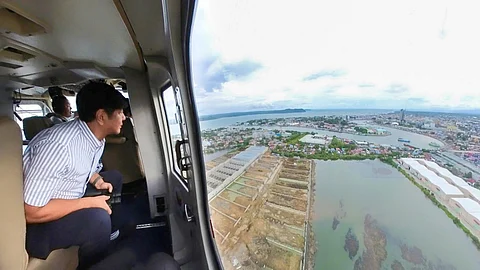
- NEWS
- the EDIT
- COMMENTARY
- BUSINESS
- LIFE
- SHOW
- ACTION
- GLOBAL GOALS
- SNAPS
- DYARYO TIRADA
- MORE

The government’s flood control program continued to be swamped in controversy on Thursday after the Department of Public Works and Highways (DPWH) confirmed that 6,021 out of 9,855 projects — worth over P350 billion — had no clear record of what was actually built, repaired, or rehabilitated.
The findings — covering works from July 2022 to May 2025 — were revealed by DPWH Secretary Manuel Bonoan who admitted that many projects lacked even the most basic details such as locations, dates, and funding amounts.
“That was the analysis that came out of our submission,” Bonoan said in a radio interview. “That’s why the President publicized the list so we could get the feedback of the people on whether the contractors’ projects have been useful or not. I have already instituted the verification of these projects.”
President Ferdinand R. Marcos Jr. earlier disclosed that only 15 contractors cornered nearly 20 percent of the P545.65-billion allocation for flood control — five of them getting projects throughout almost the entire country.
The flood-control projects scandal took a personal turn in the Senate this week after Senate President Chiz Escudero admitted receiving P30 million in a campaign contribution for the 2019 elections from one of the government contractors named by Mr. Marcos.
Escudero confirmed the donation by longtime friend Lawrence Lubiano of Centerways Construction and Development Inc. He, however, claimed the issue raised against him was part of a demolition job aimed at ousting him from the Senate presidency for his perceived role in the shelving of the impeachment complaint against Vice President Sara Duterte.
The Senate archived the House impeachment complaint that was signed by 215 congressmen after the Supreme Court declared it unconstitutional for violating the one-year ban on multiple impeachment complaints and for supposedly denying Duterte due process.
Apparently reacting to Escudero’s admission, Commission on Elections Chairperson George Garcia and election lawyer Romulo Macalintal both said it was illegal for government contractors to make campaign donations.
At the DPWH, Bonoan said he deployed a special team from the central office to the regional and district offices to go over the flagged projects with a fine-tooth comb.
“The other information is un-statused. Are the flood control projects still there, or were they already destroyed? Where were they located? So they have to be verified,” he said.
Despite the billions of pesos apparently lost to corruption, Malacañang said the 15 contractors will not be blacklisted until the investigation is completed.
‘Spill the dirt’
Meanwhile, Malacañang has called on Baguio City Mayor Benjamin Magalong to submit to the President his list of 67 lawmakers with alleged links to contractors.
“Whatever Mayor Magalong can do to help, it is better that he tell the President. It may not be necessary to have a lead because there is a mechanism and system in place according to the President,” Palace Press Officer Undersecretary Claire Castro said Thursday.
“If this is complete, he can submit it immediately to the President. And if needed, to be sued or charged with sufficient evidence, it should be done right away,” she added.
Magalong had earlier claimed that lawmakers facilitated the entry of favored contractors into infrastructure projects. Castro said that if the mayor has the dirt on other rackets — such as overpriced rock netting and the so-called cat’s eyes — he should spill that too.
Two weeks after his promise in his State of the Nation Address to root out corruption in flood control works, Marcos unveiled a website where the public can upload complaints and commendations about unfinished, abandoned, ghosted, and completed projects.
Flood-related disasters impose an enormous economic burden on the country. Over the decades, floods have caused annual economic losses estimated at US$500–$625 million, displaced thousands and inflicted damage on infrastructure and agriculture.
Between 1978 and 2018, floods killed nearly 2,847 Filipinos, affected some 30 million people, and caused $3.5 billion in total economic losses.
Likewise, water-related disasters — including floods and storms — could cost the economy $124 billion between 2022 and 2050, equivalent to an average annual GDP loss of about 0.7 percent, with floods alone accounting for a large share of these losses.
